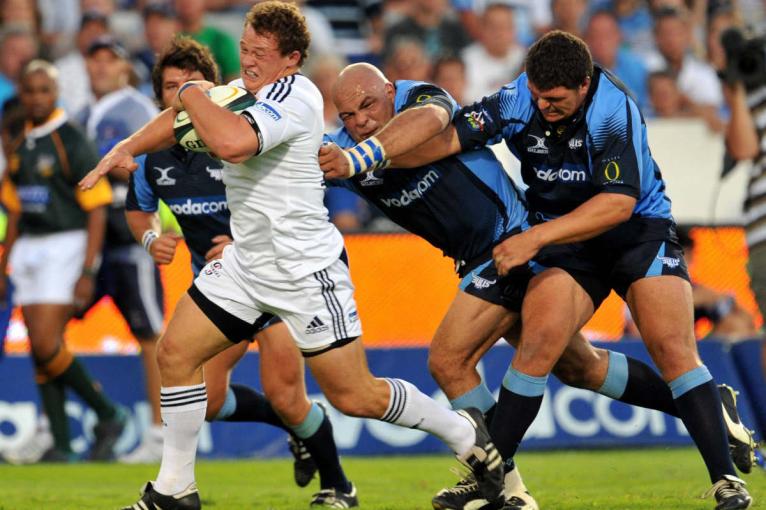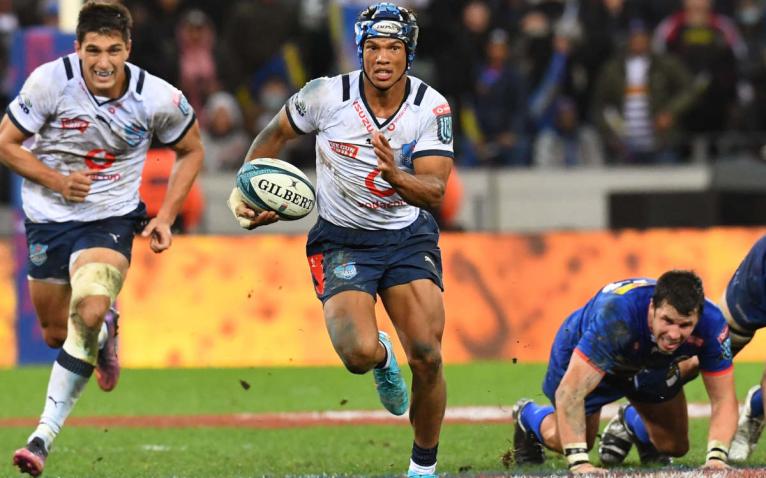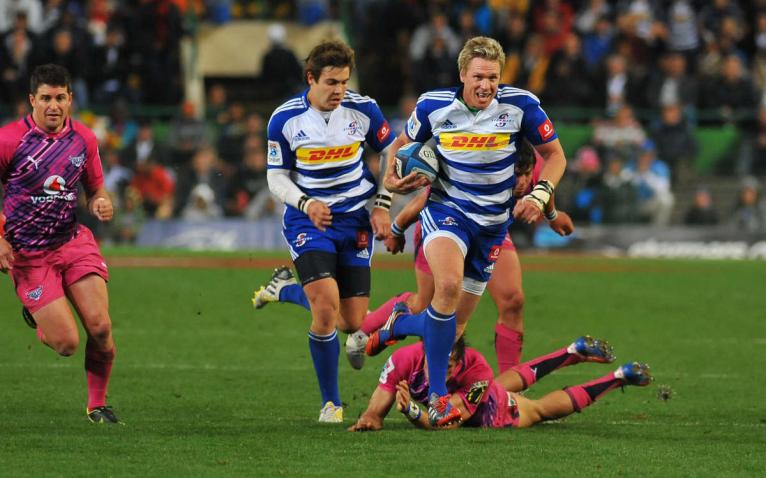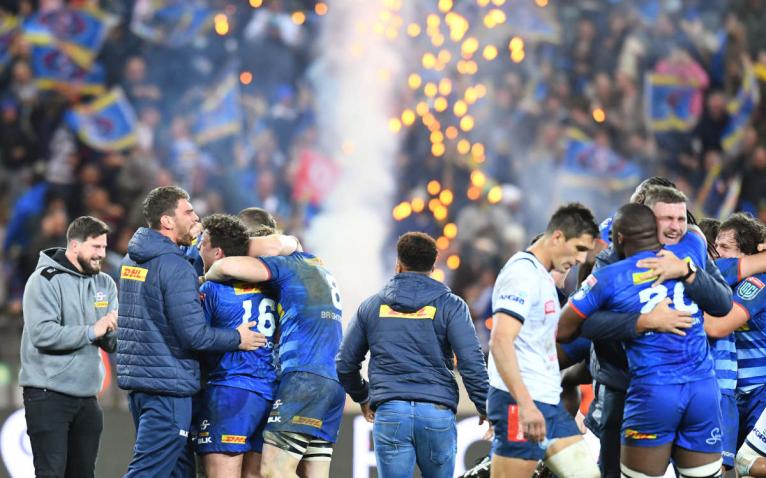When Deon Fourie was a little boy he used to collect blades of grass. Kikuyu grass to be exact. And though this lush subspecies is found almost everywhere in South Africa, Fourie would only source his stash from a very specific spot.
“My dad had a box at Loftus and we’d go watch the Bulls every time they played at home,” the Stormers and Western province loose forward explains. “Back then you could run on to the field after the game and high five the players and play rugby with your friends.
“We’d be out there until they turned the floodlights off and then I’d run up to my dad. But I always grabbed a handful of the grass and put it in my wallet. At school on Monday I’d show my friends and say, ‘I was at Loftus’. I felt like a legend.”
Born in Pretoria and schooled to the north in Polokwane, Fourie’s veins ran blue with passion for the Bulls. His father captained the province at Craven Week, the prestigious U18 tournament viewed as a stepping stone for would-be Springboks.
At Loftus, the young Fourie would sit pitch-side with a slack jaw, gawping at the size of the behemoths on show who seemed to always tower over their opponents. Maybe it was a trick of the Highveld light or maybe there really was something in the beef up north. Whatever it was, Fourie had this image that whatever deity handed out extra heft to rugby players, they offered additional helpings to his beloved Bulle.

But the gods would play their tricks. At the opposite end of the country, 1,454km away, an offer arrived that was too good to refuse. If Fourie wanted to pursue his dream of becoming a professional rugby player, he’d have to do it in the blue and white hoops of Western Province.
“They were the enemy growing up and now I was going to play for them,” Fourie says with a laugh. “It’s funny how things work out. It felt weird at first but that passed quickly. Now I’m fully on the other side of this rivalry.”
It is a feud that dwarfs all others in South African rugby. There’s a case to be made that it is the most bitterly contested conflict in domestic rugby anywhere in the world. They’re the two most successful teams in Currie Cup history with 59 titles between them from 90 editions of the world’s oldest club competition.
The professional era has diluted some of the tribalism. Now they’re franchises and go by their modern monikers of the Bulls and Stormers. But their histories stretch back to a sepia-toned past when the two powerhouses in the Republic were known as Northern Transvaal and Western Province.
There’s always a bit of extra needle when they meet. I’d say there’s even a bit of hate when they get together.
Jean de Villiers, Springbok legend
“There’s always a bit of extra needle when they meet,” says Jean de Villiers, a former captain of the Stormers and the son of Andre who played for Western province in the 1970s. “It’s the big one. No doubt about that. I’d say there’s even a bit of hate when they get together.”
It started in earnest in 1946. Before then, and right back to the founding of the Currie Cup in 1892, Western Province had a vice-like grip on South African rugby, winning 16 of the first 19 tournaments. But after a six year break during World War Two, in the final at Loftus, their adversaries to the north claimed their first title in dramatic fashion.
In the dying moments of the game, and with Western Province leading, Northern Transvaal’s flyhalf, Hannes ‘Hansie’ Brewis, hoofed the ball upfield from deep in his own half. Con de Kock, the Western Province fullback, simply had to get the ball out of play to secure victory. He stumbled at the crucial moment and allowed Johnny Lourens to steal in to give Northern Transvaal the crown.
“That coincided with a growing sense of national pride in the north,” explains the author and historian Wim van der Berg, whose list of published titles includes ‘Blue Bulls: 70 years of Glory’. “It proved that the region was strong. This geographic divide, which had always been there to a degree, now had a sports angle to it.”
The North-South rivalry, as it is often dubbed, echoes more serious struggles of the past as well as deeply ingrained perceptions in the country. For Des Latham, a journalist and host of the sweeping podcast ‘The Anglo-Boer War’, which chronicles the four-year conflict between the British Empire and Afrikaans-speaking Boer republics around the turn of the 20th century, this rugby feud stretches all the way to the 1700s.

“The animosity predates the Boer War,” Latham says. “It’s built up over generations. The empowered Cape elite, the pre-Huguenot farmers of Swellendam and Stellenbosch [two historic towns near Cape Town] were seen by the Trekkers [Afrikaans farmers who fled British influence] as the establishment, the rich. The hardier Trekker took off for the hinterland and that narrative has remained true since.”
Fourie explains that all the girls in his school were “obsessed with Bobby Skinstad”, referring to the Western Province No 8 with movie star good looks, highlights in his hair and a diamond stud in his tongue, which he’d show off whenever he crossed the try-line in dazzling fashion.
It’s like Cape Town is full of models and Pretoria is full of meaty Boers
Morne Steyn
“It’s like Cape Town is full of models and Pretoria is full of meaty Boers,” jokes Morne Steyn, the veteran flyhalf with over 2,500 points from 241 appearances for the Bulls, including all 21 in the 2009 Currie Cup semi final which was won thanks to his 77th minute penalty.
Other stereotypes have calcified into lore. Traditionally the Bulls have relied on a quintessentially South African power game. Their most successful side, one that claimed five Currie Cups and three Super Rugby titles between 2002 and 2010, leaned into a pragmatic style of rugby.
An indomitable pack with Victor Matfield and Bakkies Botha at the heart was marshalled by the generalissimo Fourie du Preez and supplemented by a freewheeling Pierre Spies. When the ball went beyond the man at first receiver, Bryan Habana was ready to pounce.
The Stormers have historically taken a different approach. As if mirroring cosmopolitan Cape Town, the men who ply their trade in the shadow of Table Mountain regard themselves as entertainers. This is a side that wants to give the ball air and create space for their jet-heeled outside backs who have nitroglycerin in their boots and scrum caps on their heads.

At least that’s the cliche. But is there any truth to this? De Villiers isn’t so sure.
“Maybe that was the case ten years ago but the modern game has brought teams much closer together,” says the man who scored two tries in his first North-South derby, scooping the man of the match award in a thumping 63-26 home win in 2003. “Every side has to be strong up front and has to have pace at the back. There’s less of a clear identity now.
“Sometimes I find myself supporting the Bulls. Because of [head coach] Jake [White] and the time we had together with the Boks. And because they’ve got Canan Moodie and Kurt-Lee Arendse playing for them. They’re both from Paarl like me. They’re representing our community with such honour and I’m so proud of them and want them to do well. I think that hatred isn’t what it used to be.”
Before South Africa’s return from sporting isolation, local derbies represented the pinnacle of the sport. These interprovincial clashes were therefore elevated to the level of a Test match. Civic pride was at stake. And the passion that South African rugby fans now feel for the Springboks was channeled into the only outlet available to them.
The young boy, no older than ten, had his middle finger raised as well, sending a clear message that Fourie and his teammates were not welcome around these parts.
“They were massive back in the day,” De Villiers adds. “But now you very rarely get to play for the team you supported as a boy. Rugby is a business. You have this limited window to maximise your earning potential and that means you go where you’re wanted, not where you want to go. Having said that, I think this is one of those rare games that still stirs the blood. Maybe it’s not exactly how it was, but it’s as close as we can get in this modern world.”
Fourie resonates with this sentiment. It was 2009 and the lifelong Bulls fan had been wearing Western Province clobber for three years. He was back in Pretoria on a bus crawling its way from the team hotel to Loftus.
Stopped at a traffic light, Fourie looked out the window and witnessed a scene that transported him to his childhood. A young boy stood beside his father in front of a charcoal-burning braai. Boerewors and chops were sizzling, giving off an aroma that is intrinsically connected with rugby in South Africa.
Fourie smiled to himself, remembering the times we spent with his father, how they bonded over the sport and the pageantry that circles it. Just then he saw a hand raised skyward. The father’s middle finger was standing to attention and directed towards him. It wasn’t the only one. The young boy, no older than ten, had his middle finger raised as well, sending a clear message that Fourie and his teammates were not welcome around these parts.

“I loved it,” Fourie proclaims “It showed the passion. I was so hyped after that. In the game I got into a tussle with Bakkies Botha. Never could I imagine that I would ever disrespect him but here I was shoving him and swearing at him. I scored a try as well after bumping over Guthro Steenkamp. We lost the game [14-10] but that was one of the best games I’ve ever been involved in. It’s an honour playing in this rivalry.”
A new chapter will be written on Saturday as the old enemies meet again in the United Rugby Championship quarterfinals in Cape Town Stadium. The Stormers are currently on a five game winning streak and have further bragging rights after their 18-13 win in last year’s final.
Part of John Dobson’s success has been in passing on the message that this game really matters and that finding the identity is crucial. Maybe the Bulls are still trying to find that identity, that Bulls way.
Jean de Villiers
“Part of John Dobson’s success has been in passing on the message that this game really matters and that finding the identity is crucial,” says De Villiers, praising the Stormers coach. “Maybe the Bulls are still trying to find that identity, that Bulls way.
“In these games it often comes down to the things that are hard to coach. The better team will win more often than not but in the big rivalries in sport funny things happen. Emotion plays a role. I think the Stormers have harnessed that.”
The URC has shifted South Africa’s spiritual centre. Super Rugby before that did the same. The Currie Cup is not what it used to be and a large portion of the Springboks squad now represent teams in Europe and Japan.
But as the years roll on and traditions change, some values from the old world remain. This North-South rivalry, one with roots in civil war and fuelled by cultural vanities remains the beating heart of South African rugby, one that’s filled with hot blue blood.



Comments
Join free and tell us what you really think!
Sign up for free